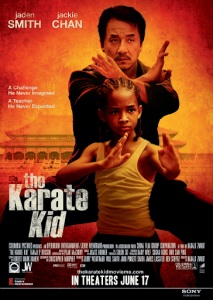26 The Karate Kid – 功夫夢
Bryant
simplified Chinese: 功夫梦; pinyin: Gōngfū mèng
The Karate Kid

by Sony
Licensed by Columbia Pictures Industries
In the martial arts movie The Karate Kid (2010) (功夫梦), a young boy named Dre Parker (Jaden Smith) and his mother (Taraji P. Henson) move from Detroit to Beijing. In the beginning, Dre Parker starts off battling to adapt to his new life. In the midst of his battle, Dre finds himself to be a target of a gang of bullies led by Cheng (Zhenwei Wang), which introduces Mr. Han (Jackie Chan), a master martial artist who then serves as Dre’s mentor and trains him in the art of Kung Fu. The film, which is a recreation of the original Karate Kid from 1984, is heavily influenced by Chinese popular culture. Kung Fu, one of China’s most well-known exports, is a martial art with a long history and tradition in the nation. Many facets of Chinese culture, including its architecture, language, and cuisine, are featured in the film, which was shot on-site in China. The value of discipline, which is fundamental to Chinese culture, is one of the film’s major themes. Dre learns from Mr. Han that he needs to have concentration and discipline in order to practice Kung Fu well. This is demonstrated in the well-known “jacket on, jacket off” (similar to wax on wax off) scene from the film, in which Mr. Han instructs Dre in the fundamental movements of Kung Fu through a succession of monotonous drills. The mentor’s role, which is significant in Chinese culture, is another significant element of the film. In addition to being a skilled martial artist, Mr. Han acts as a parent figure for Dre, offering advice and assistance as he adjusts to life in China. Many Chinese martial arts place a strong emphasis on the mentor-student relationship, and the film honors this heritage. Chinese folklore and mythology are also incorporated into Karate Kid, including the story of the monkey monarch. One scene features Mr. Han telling Dre the tale of the monkey king, a strong and sage figure from Chinese folklore. This gives the film an additional layer of depth and richness and further ties it to Chinese society. Overall, both in terms of its themes and its representation of Chinese culture, Karate Kid has had a major influence on Chinese pop culture. The film received acclaim for its accurate depiction of Chinese traditions and customs and was a box office hit in China, earning over $100 million. Chinese youth have become more interested in Kung Fu and other martial arts as a result of the movie’s popularity because of its lesson about tenacity, self-control, and respect.
Citations:
Los Angeles Times. (2010, May 30). ‘Karate Kid’ update breaks down some Chinese walls. Los Angeles Times. Retrieved March 12, 2023, from https://www.latimes.com/archives/la-xpm-2010-may-30-la-ca-karatekid-20100530-story.html
Scott, A. O. (2010, June 10). In this remake of an ’80s martial arts fable, it’s jacket on, jacket off. The New York Times. Retrieved March 12, 2023, from https://www.nytimes.com/2010/06/11/movies/11karate.html
Sun Wukong. Mythopedia. (n.d.). Retrieved March 12, 2023, from https://mythopedia.com/topics/sun-wukong
See Also
https://www.imdb.com/title/tt1155076/?ref_=nv_sr_srsg_3
Media Attributions
- Karate Kid

